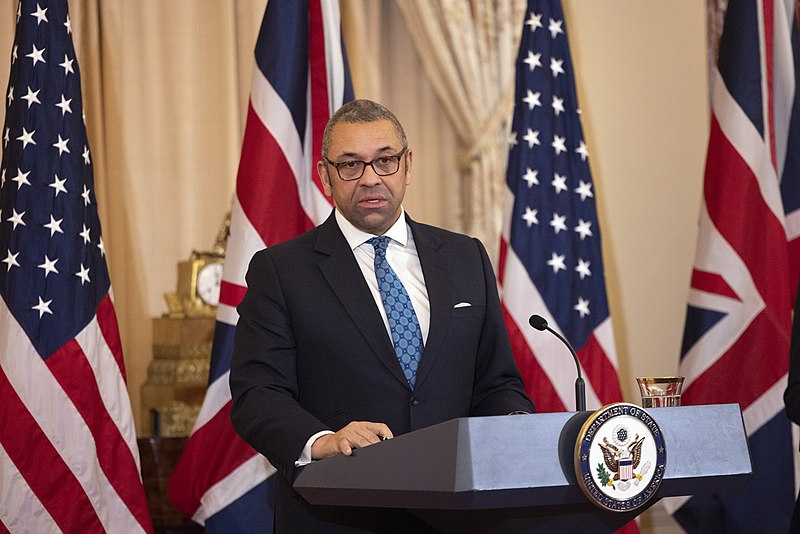The British government has imposed a new round of sanctions this week as Russia’s aggression on Ukraine is reaching one year. London has now targeted entities and individuals involved in the supply of military equipment for Russian forces.
The UK imposed new sanctions on Wednesday, targeting the “Russian military and Kremlin elites.” Six entities were targeted in the latest round of sanctions over allegedly providing military equipment to Russia’s military, including drones for use in Ukraine. One entity connected to financial networks that help “maintain wealth and power amongst Kremlin elites” was also sanctioned, along with eight other individuals, the government said in a statement as Ukrainian President Volodymyr Zelenskyy visited the UK.
“Ukraine has shown Putin that it will not break under his tyrannical invasion. He has responded by indiscriminately striking civilian areas and critical national infrastructure across the country,” said foreign secretary James Cleverly in a statement. “We cannot let him succeed. We must increase our support.”
The UK has sanctioned over 1,300 Russian entities and individuals since the war in February last year. London has also sanctioned IT service firm Moscoms for acting as a “nexus for the Russian elite” by providing host domains to those involved in assaulting Ukraine.
The individuals sanctioned include Russia’s Presidential Commissioner for Human Rights Boris Titov, former deputy firm of Russia’s largest privately-owned oil refinery Nikolay Egorov, pro-Kremlin news outlet Regum owner Sergey Rudnov, Bank Rossiya and National Media Group shareholder Svetlana Krivonogikh, Russian aircraft repair firm Aerostart owner Viktor Myachin, Russian pharmaceutical firm R-Pharm chairman Alexey Repik, former presidential aide Evgeny Shkolov, and Titov’s son and Delovaya Rossiya president Pavel Titov.
On Thursday, the British defense ministry said in its intelligence bulletin that cross-country mobility conditions in western Ukraine remain the same, saying that the weather remains a big factor in the war. The ministry added that the CCM would likely be at its worst by mid to late March.
“Commanders on both sides will highly likely seek to avoid scheduling major offensives at such times. However, perceived political or operational opportunities can override such concerns as demonstrated by Russia launching its invasion in late February 2022,” said the ministry.



 New York Legalizes Medical Aid in Dying for Terminally Ill Patients
New York Legalizes Medical Aid in Dying for Terminally Ill Patients  Bosnian Serb Presidential Rerun Confirms Victory for Dodik Ally Amid Allegations of Irregularities
Bosnian Serb Presidential Rerun Confirms Victory for Dodik Ally Amid Allegations of Irregularities  Taiwan Says Moving 40% of Semiconductor Production to the U.S. Is Impossible
Taiwan Says Moving 40% of Semiconductor Production to the U.S. Is Impossible  Ghislaine Maxwell to Invoke Fifth Amendment at House Oversight Committee Deposition
Ghislaine Maxwell to Invoke Fifth Amendment at House Oversight Committee Deposition  Trump’s Inflation Claims Clash With Voters’ Cost-of-Living Reality
Trump’s Inflation Claims Clash With Voters’ Cost-of-Living Reality  China Overturns Death Sentence of Canadian Robert Schellenberg, Signaling Thaw in Canada-China Relations
China Overturns Death Sentence of Canadian Robert Schellenberg, Signaling Thaw in Canada-China Relations  Trump Backs Nexstar–Tegna Merger Amid Shifting U.S. Media Landscape
Trump Backs Nexstar–Tegna Merger Amid Shifting U.S. Media Landscape  Japan’s Prime Minister Sanae Takaichi Secures Historic Election Win, Shaking Markets and Regional Politics
Japan’s Prime Minister Sanae Takaichi Secures Historic Election Win, Shaking Markets and Regional Politics  U.S. Lawmakers to Review Unredacted Jeffrey Epstein DOJ Files Starting Monday
U.S. Lawmakers to Review Unredacted Jeffrey Epstein DOJ Files Starting Monday  Trump Says “Very Good Talks” Underway on Russia-Ukraine War as Peace Efforts Continue
Trump Says “Very Good Talks” Underway on Russia-Ukraine War as Peace Efforts Continue  Jack Lang Resigns as Head of Arab World Institute Amid Epstein Controversy
Jack Lang Resigns as Head of Arab World Institute Amid Epstein Controversy  Trump Slams Super Bowl Halftime Show Featuring Bad Bunny
Trump Slams Super Bowl Halftime Show Featuring Bad Bunny  China Warns US Arms Sales to Taiwan Could Disrupt Trump’s Planned Visit
China Warns US Arms Sales to Taiwan Could Disrupt Trump’s Planned Visit  Antonio José Seguro Poised for Landslide Win in Portugal Presidential Runoff
Antonio José Seguro Poised for Landslide Win in Portugal Presidential Runoff  Anutin’s Bhumjaithai Party Wins Thai Election, Signals Shift Toward Political Stability
Anutin’s Bhumjaithai Party Wins Thai Election, Signals Shift Toward Political Stability  India–U.S. Interim Trade Pact Cuts Auto Tariffs but Leaves Tesla Out
India–U.S. Interim Trade Pact Cuts Auto Tariffs but Leaves Tesla Out  Japan Election 2026: Sanae Takaichi Poised for Landslide Win Despite Record Snowfall
Japan Election 2026: Sanae Takaichi Poised for Landslide Win Despite Record Snowfall 































